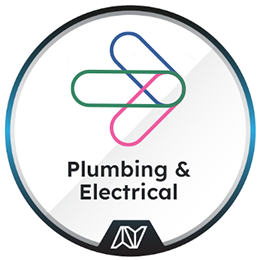
minutes average completion time
Introduction to Plumbing & Electrical
In this micro course, we will introduce you to Electrical & Plumbing, which will help you gain the necessary hand skills and theoretical knowledge required to gain employment in the construction industry.
Introduction to Plumbing Installation
Plumbing is all about installing and fixing the pipes that bring water into your home, take waste away, and help keep everything running smoothly. Without plumbers, we wouldn’t have clean water to drink, or safe ways to dispose of waste.
Plumbing is an essential part of everyday life, and it plays a huge role in making sure buildings are comfortable and safe to live or work in.
What Skills Do Employers Look For?
If you’re interested in a career in plumbing, there are certain skills that employers are looking for. Here are a few of the most important:
Problem Solving:
Plumbers often have to find and fix issues with pipes, drainage systems, and fixtures, so being able to think quickly and creatively is super important.
Attention to Detail:
Plumbing systems need to be installed correctly the first time to avoid issues like leaks or water damage, so attention to detail is key.
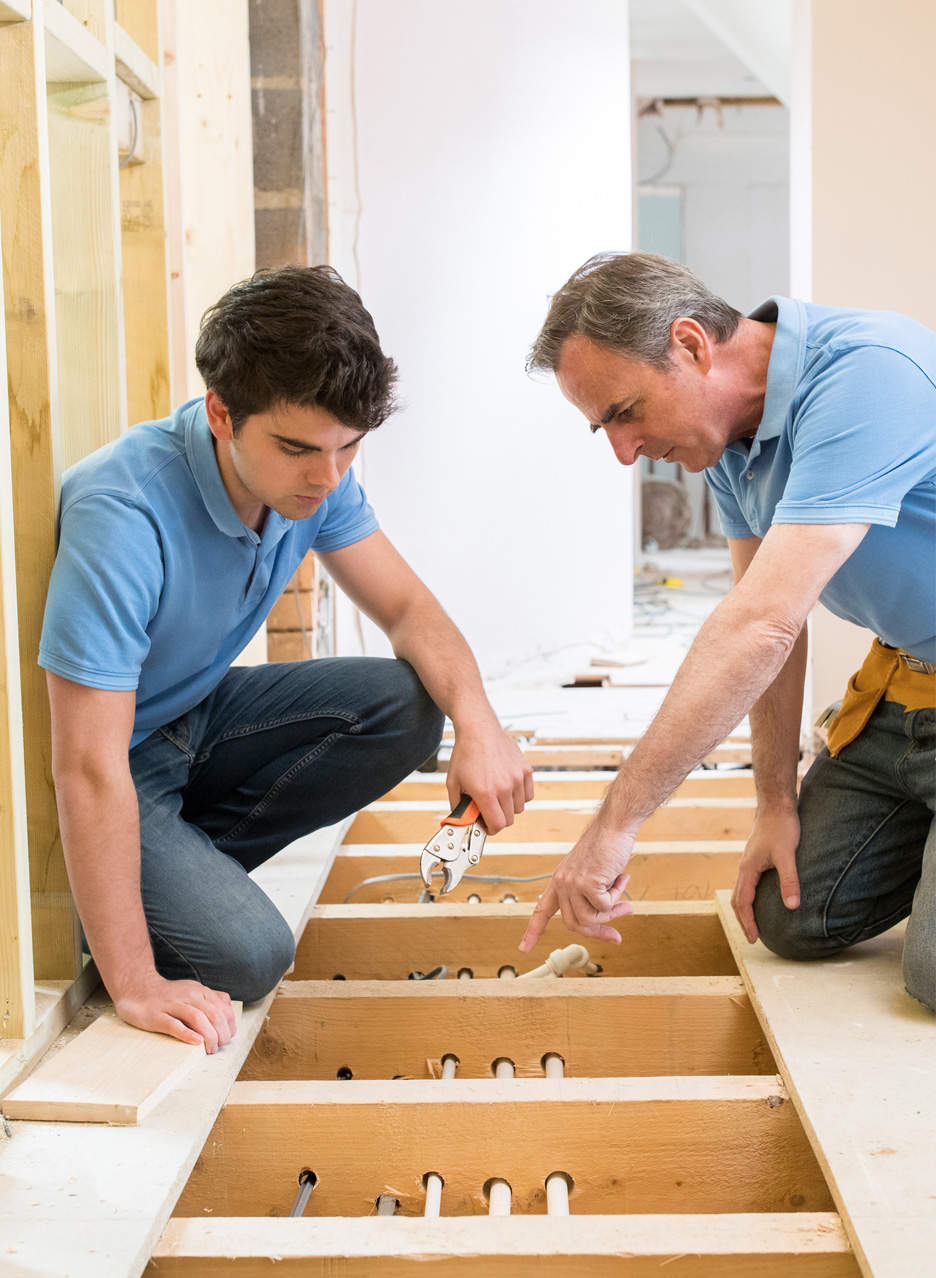
Technical Skills:
Knowing how to use plumbing tools (like wrenches, drills, and pipe cutters) and reading blueprints (diagrams of pipe layouts) are essential parts of the job.
Physical Strength & Stamina:
Plumbing can involve lifting heavy materials and working in awkward spaces, so being physically fit is useful.
Communication:
You’ll often work with homeowners, builders, and other tradespeople, so being able to explain things clearly and politely is important.
Plumbing is one of the oldest trades in the world. In fact, the ancient Egyptians and Romans were already building plumbing systems over 4,000 years ago.

Did you know?
In the UK, over 120,000 plumbers are working hard to keep things running smoothly!
Plumbing Qualifications and Apprenticeships
To become a plumber in the UK, there are several ways you can get started, depending on how you like to learn and what interests you.
Here’s how you can begin your journey in plumbing:
Apprenticeship (Best for Learning on the Job)
One of the most common ways to train as a plumber is through an apprenticeship. This means you’ll spend several years (usually 3-4 years) working alongside a qualified plumber while learning the trade. You’ll get a hands-on, practical education while earning a wage! By the time you finish your apprenticeship, you’ll be a fully qualified plumber.
College or Training Courses (For a More Classroom-Based Start)
You can also take a Level 2 or Level 3 plumbing course at college or a training provider. These courses usually last around 1-2 years, and they combine theory with practical work. During your studies, you’ll learn about plumbing systems, safety, and how to use tools. After finishing the course, you can go straight into work or carry on with an apprenticeship to gain more hands-on experience.
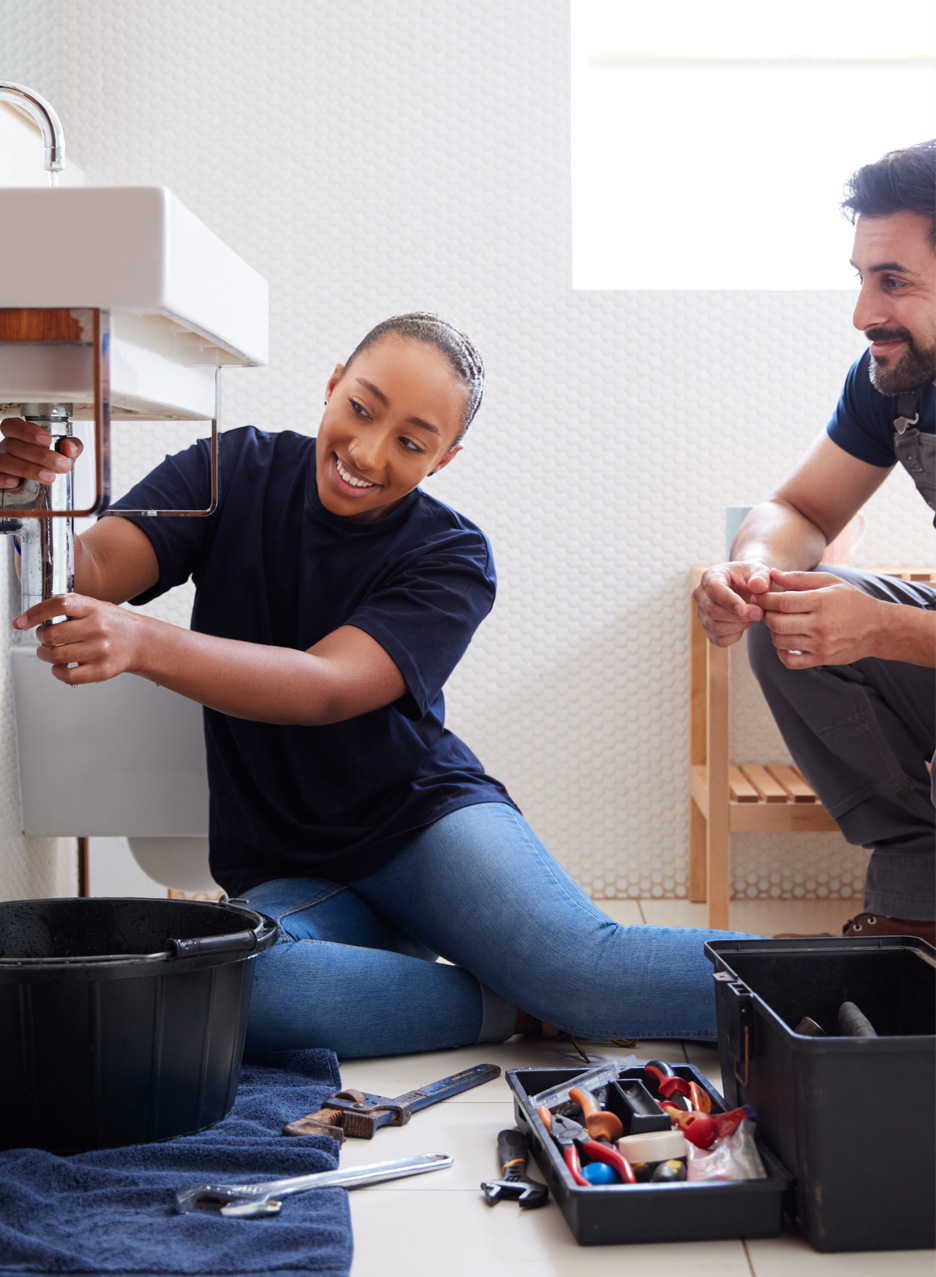
Advanced Qualifications (For Career Progression)
Once you’ve gained a few years of experience, you can look to advance your skills and qualifications. Becoming a Gas Safe Registered Plumber is one example. This allows you to work with gas systems (e.g., gas boilers), which is an important skill to have in plumbing. You can also specialise in other areas, like heating and ventilation, or even start your own plumbing business.
Career Progression and Opportunities
The plumbing sector offers lots of opportunities to grow and move up in your career. Here are some possible career paths:
Apprentice Plumber:
As an apprentice, you’ll spend most of your time learning on the job, helping more experienced plumbers and gaining practical skills.
Qualified Plumber:
After completing your training, you’ll be able to work independently, installing and repairing plumbing systems in homes and businesses.
Advanced Plumber:
Once you have more experience, you can specialise in areas like gas fitting, central heating, or water systems.
Plumbing Supervisor:
After a few years, you could supervise other plumbers on bigger projects, such as large building sites or commercial buildings.
Plumbing Business Owner:
Many plumbers choose to run their own business, offering plumbing services to customers. This gives you more control over your work and potential earnings.
Plumbing Inspector:
If you enjoy making sure things are done correctly, becoming a plumbing inspector is a good option. You’ll inspect plumbing installations to make sure they meet safety and building standards.
Why Plumbing?
Plumbing is a fantastic career choice that offers job security, good wages, and the chance to work in a variety of settings from homes to commercial buildings. If you enjoy practical work and want to make a difference in people’s lives by keeping their water systems running smoothly, plumbing could be the perfect fit for you. Whether you start with an apprenticeship or a college course, there are plenty of opportunities to grow and develop your skills in this essential and well-paid trade!
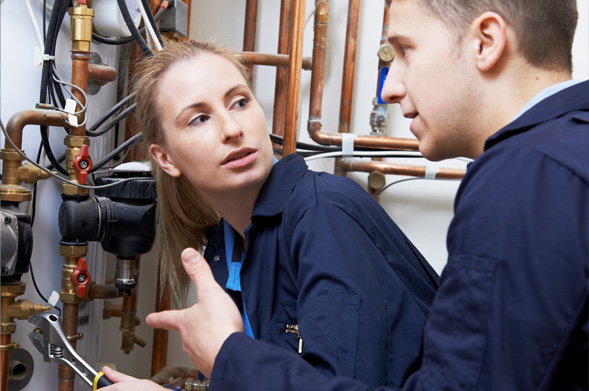
Plumbers in the UK earn an average of £30,000 to £40,000 a year, but this can increase significantly with experience, particularly if you specialise in areas like gas fitting
Introduction to Electrical Installation
Electrical installation is all about setting up, installing, and maintaining the wiring and systems that bring electricity into homes, schools, offices, and factories.
Without electricians, we wouldn’t have the power to charge our phones, cook dinner, or even watch TV! Electrical installation is essential for making sure everything works safely and efficiently in a building.
What Skills Do Employers Look For?
If you’re thinking about becoming an electrician, here are some important skills that employers look for in candidates:
Problem Solving:
Electricians need to diagnose and solve electrical problems quickly. Whether it’s a flickering light or a power outage, being able to figure out the cause of an issue is crucial.
Attention to Detail:
Electrical installation requires precise work, and a small mistake could cause big problems, like power cuts or even safety risks. Attention to detail is very important!

Technical Skills:
Knowing how to work with wires, circuit boards, and electrical tools (such as voltmeters and cable cutters) is essential. You’ll need to be comfortable reading electrical plans and diagrams.
Physical Strength & Stamina:
Being an electrician can involve working in awkward spaces, climbing ladders, and sometimes lifting heavy equipment. Being physically fit helps you get the job done!
Communication Skills:
Electricians often work with other tradespeople and customers, so it’s important to be able to explain what’s going on clearly and politely.
Electricity is one of the most powerful and dangerous forces on Earth, so it’s crucial to have skilled electricians ensuring everything is installed correctly.

Did you know?
The average UK home has more than 20 electrical circuits, from lights to heating systems to kitchen appliances!
Electrical Qualifications and Apprenticeships
Becoming an electrician in the UK is a journey that combines learning the theory behind electrical systems with practical, hands-on experience.
There are several ways you can train and get started in this exciting field:
Apprenticeship (Best for Learning on the Job)
Many electricians start their careers with an apprenticeship. Apprenticeships typically last 3 to 4 years, and during that time, you’ll work alongside an experienced electrician, learning how to install, maintain, and repair electrical systems. Plus, you’ll get paid while you learn!
College or Training Courses (For a More Classroom-Based Start)
You can also choose to take a Level 2 or Level 3 Electrical Installation course at college. These courses usually take 1-2 years and combine theory with practical training. You’ll learn everything from reading electrical plans to wiring circuits and ensuring safety standards are met. After finishing your course, you can either go straight into work or look for an apprenticeship to gain more hands-on experience.
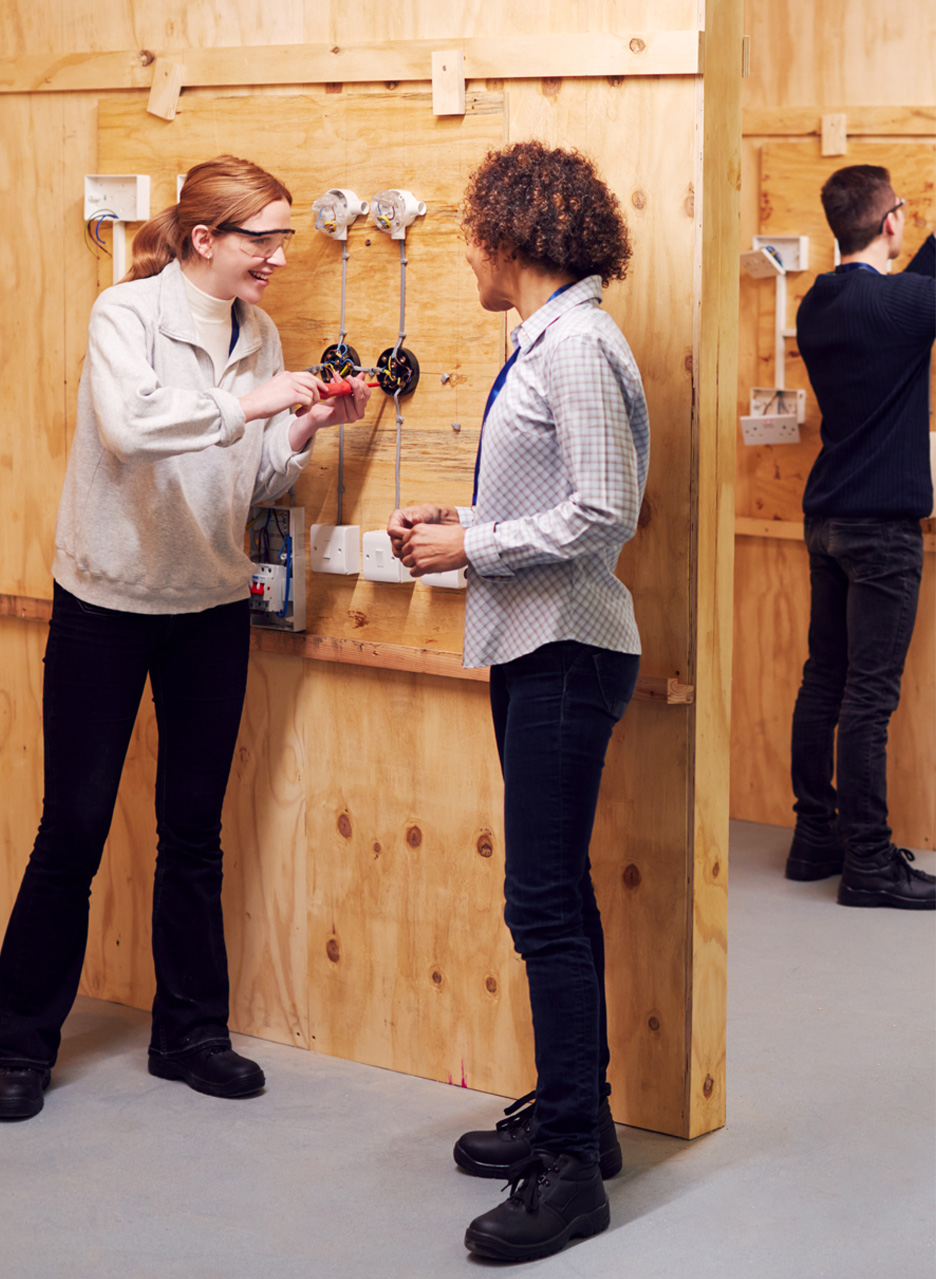
Advanced Qualifications (For Career Progression)
Once you’ve gained some experience as an electrician, you can move up to specialised qualifications. For example, you might choose to focus on renewable energy systems, like solar panels, or become an expert in fire alarm installations. With extra training, you can also become an Approved Electrician (recognised by the National Inspection Council for Electrical Installation Contracting, or NICEIC), which allows you to sign off on electrical work and take on more responsibility.
Career Progression and Opportunities
The electrical installation sector offers many opportunities to develop your skills and progress in your career. Here are some options for career growth:
Electrician Apprentice:
As an apprentice, you’ll spend most of your time learning from experienced electricians, helping them with installations, repairs, and maintenance.
Qualified Electrician:
After completing your training, you’ll be able to work independently, installing and repairing electrical systems in homes and businesses.
Approved Electrician:
With more experience, you can gain Approved Electrician status, which allows you to self-certify electrical installations and work on larger, more complex projects.
Electrical Supervisor:
After a few years, you might supervise other electricians, especially on big building sites or in industrial settings. This role involves overseeing the work of others and ensuring projects are completed safely and on time.
Electrical Business Owner:
If you enjoy working independently, you could start your own electrical business, offering electrical services to customers.
Electrical Inspector:
If you prefer working behind the scenes, becoming an electrical inspector could be a good option. You’ll inspect installations to ensure they meet safety standards and regulations.
Why Electrical Installation?
Electrical installation is a fantastic career path with great earning potential, job security, and plenty of room for growth. Whether you start with an apprenticeship or a college course, there are lots of opportunities to specialise and advance your career. If you enjoy practical work, problem-solving, and ensuring that buildings have reliable power, then electrical installation might be the perfect career for you!
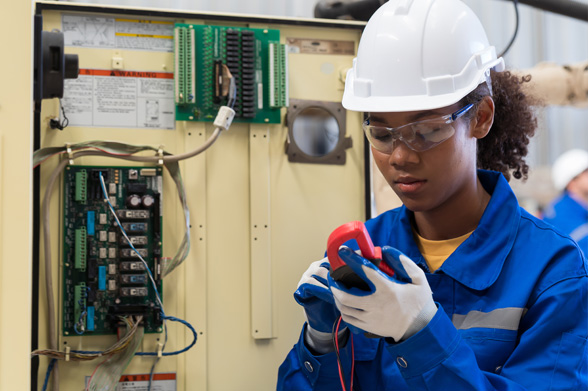
Electricians in the UK typically earn between £30,000 and £40,000 a year, but this can increase if you specialise or work on bigger projects.
Career Path Questionnaire
This simple questionnaire might help you to identify some career pathways that suit your personal interests and your skills. This questionnaire comes in 2 parts. The first part of this activity is a simple questionnaire.
Using the options in the table below, answer each of the questions by selecting a number in one of the columns, based on the following:
1 = Dislike a lot 2 = Dislike 3 = Don’t Mind 4 = Like 5 = Like a lot
Based on your personal interest and skills, you may be interested in the jobs shown in the highlighted section below.
Working with IT
and projects
Roles explored in this course:
TBC.
You scored
in this category.
Working with people
and processes
Roles explored in this course:
TBC.
You scored
in this category.
Working on your feet
or outdoors
Roles explored in this course:
TBC.
You scored
in this category.
Check Your Knowledge
So now you’re well on the way to understanding about Electrical & Plumbing, answer the multi-choice questions below to see how much you really know.
Good luck!
Well done. You have successfully achieved the pass mark for this course. All the correct answers are now shown.
You haven’t achieved the pass mark on this occasion. Have another go.
You haven’t quite reached the pass mark for this course, but all of the correct answers are now shown. Please study these before moving on, or feel free to go back and look again at any of the pages of this course.
Congratulations
You have successfully completed this course.
Exit Course
